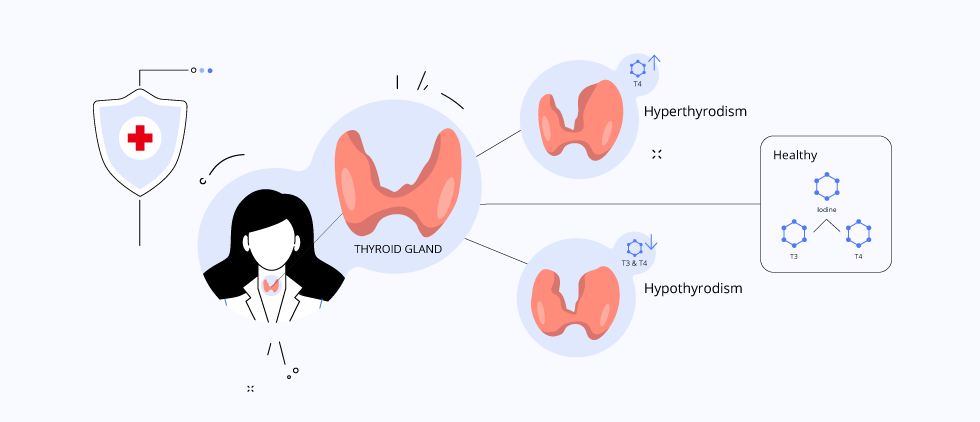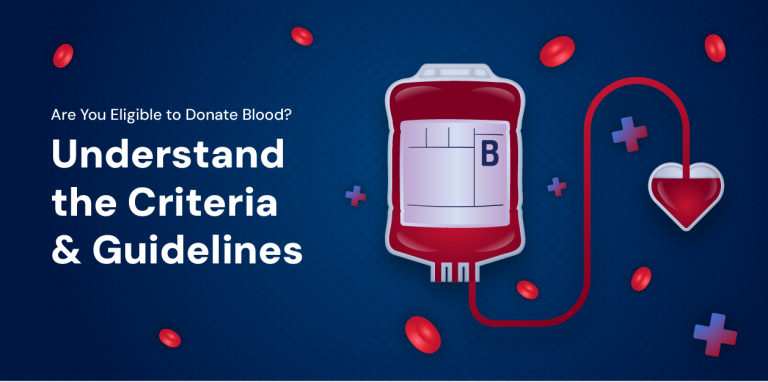There is a butterfly-shaped gland located at the base of your throat – the thyroid. It secretes hormones (chemical messengers) that not only affect your growth and development but also your metabolism. Additionally, these hormones significantly impact your heart health by regulating your heartbeat, cholesterol levels and blood pressure. However, certain factors like deficiency or genetic predisposition can adversely affect thyroid function, causing a spike or dip in hormone production. Dietary modifications, stress reduction and an active lifestyle can help manage or prevent thyroid disorders, which in turn can keep your heart healthy.
Risk Factors for Thyroid Disorders
Factors that make one highly susceptible to thyroid disorders include:
- Family History: Individuals who have family members (parents or siblings) with impaired thyroid function are at increased risk of developing the same.
- Gender: Women are 10 times more susceptible to thyroid disorders compared to men.
- Medication: Those on iodine medication or supplements are at high risk as well.
- Age: The risk of thyroid disorders increases with age, especially after one hit 60.
- Medical history: People who have had or currently have health conditions like type 1 diabetes, Addison’s disease, etc. are at high risk. In addition, those who have undergone radiation or thyroid surgery are susceptible as well.
Hypothyroidism and Hyperthyroidism
Hypothyroidism refers to a condition where the thyroid does not produce sufficient hormones to meet the body’s demands. Hyperthyroidism, on the other hand, occurs when the thyroid produces an excessive amount of hormones. Impaired thyroid function can lead to or exacerbate heart complications.
Connection between Underactive Thyroid and Cardiac Health
Hypothyroidism can affect the heart and circulatory system in the following ways:
- Low levels of thyroid hormone slow down the heart rate or pulse.
- Insufficient hormone production reduces the elasticity of the arteries, raising blood pressure.
- Low levels of hormones can elevate cholesterol levels, narrowing the arteries and obstructing blood flow to the heart.
Thyroid hormone therapy, where artificial or synthetic thyroid hormones are administered to raise their levels in the body, can reverse these effects. However, under- or over-treatment of the condition may increase the risk of heart disease.
Overactive Thyroid and your Heart
Excessive hormone production can adversely affect your heart in the following ways:
- Hyperthyroidism increases your heart rate, altering its normal rhythm.
- High hormone levels can elevate your blood pressure.
- Elevated hormone levels can exacerbate symptoms in individuals with pre-existing heart conditions or arterial blockages, potentially triggering chest pain.
Ways to Keep Your Heart Healthy
If certain signs or symptoms point towards a thyroid disorder, a routine blood test should be conducted after consulting a healthcare professional. Timely intervention is crucial to prevent serious complications.
Some simple steps that can safeguard the heart for those with thyroid disorders are as follows:
- Have a healthy diet by including fruits, vegetables and nuts; avoid iodine-rich or junk foods.
- Maintain an ideal body weight through an active lifestyle and regular exercise. Aerobic exercises like walking, jogging, or swimming will positively impact your heart.
- Quit smoking and limit alcohol consumption.
- Practices like yoga and meditation can help reduce stress, which in turn can improve your heart health.
- Adhere to the prescribed medication and do not skip doses.
Conclusion
The hormones secreted by the thyroid gland significantly impact your overall health, including that of your heart. Any imbalance in hormone production due to certain factors, however, can increase the risk of heart complications. Timely diagnosis and intervention are crucial to prevent serious consequences. Certain lifestyle alterations like having a healthy diet, maintaining an active lifestyle and letting go of vices can positively impact your heart health.
-Content partner Happiest Health





